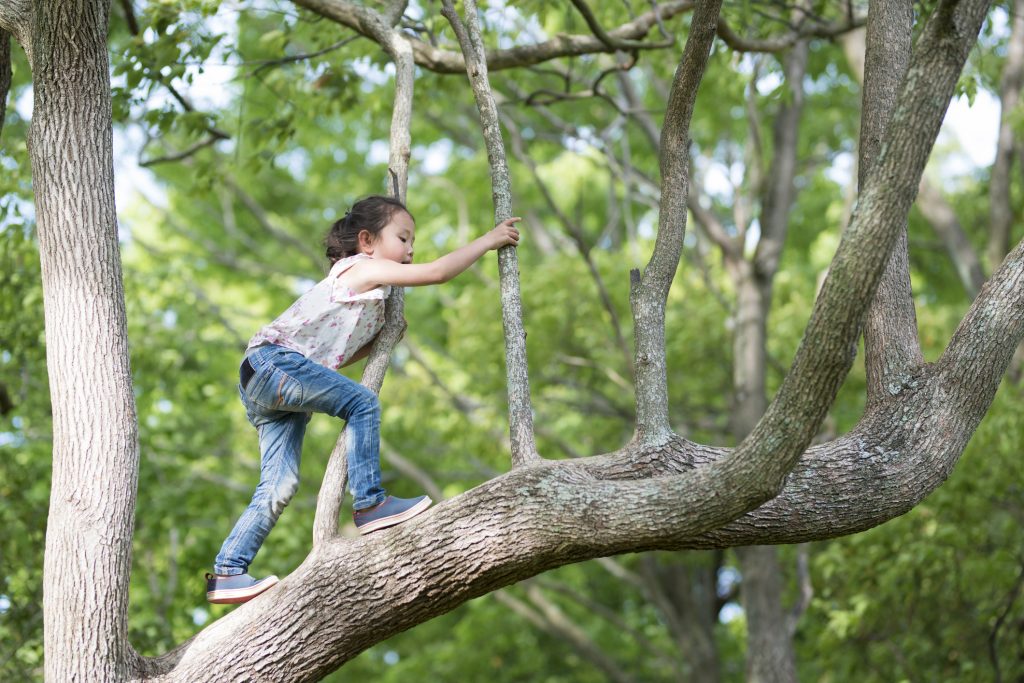Risk in play- Possibilities and Opportunities
Written by Tim Gill for Active For Life
Children hunger for a taste of freedom. They are strongly driven to get to grips with the people, places and things around them. To figure stuff out for themselves, to learn new skills, and to build their self-confidence and their sense of what they are capable of. And much of this figuring out, this learning, this confidence-building, happens when children are playing, exploring, experimenting, and testing themselves.
This ‘effort after mastery’ is an incredibly powerful, natural learning impulse. What is more, it kicks in right from birth, and can be seen throughout childhood. Just watch any toddler learning to walk, trying over and over to master the art of putting one foot in front of the other.
We know the value of giving children a little freedom. But we worry about what might go wrong – and what others might think.
Balancing freedom and safety
There’s no denying that getting the balance right between freedom and safety is harder than it was. Some parents are so worried about things going wrong – and about being judged and found wanting by their peers – that they over-compensate and overprotect their children.
The problem is that making things too safe can starve children of the very experiences that best help them learn how to keep themselves safe and healthy. As rising numbers of children and teenagers struggle with emotional and social problems, it is all the more important to get this balance right.
In the end, the only way children grow to be resilient – to be ready for the everyday challenges that life will inevitably throw at them – is by being given the freedom to learn from their own efforts, and their own mistakes.
I’ve been making the case for a balanced approach to risk in childhood for over 20 years. And in my experience, a large proportion of parents – perhaps even the silent majority – get this.
Taking a balanced approach to risk
Surely all parents want their children to be confident, capable, responsible and resilient people. And most realize that this means untying the apron strings and gradually allowing a little freedom, adventure and – yes – risk into their lives. How else can we explain the explosion in Forest School education and child care programmes, where even tiny children are spending hours every week exploring and playing in the woods?
It’s just that this majority view is increasingly drowned out by the voices of the over-anxious. Especially in an always-on, digitally-connected culture, where fear and anxiety crowd out all other emotions, leaving us struggling to keep a sense of balance and proportion.
None of this is news to most parents. The challenge is how to put these ideas into practice.
Putting ideas into practice
The first step on the road to wisdom is to reframe the whole idea of risk. We can dwell forever on worst-case scenarios about what might go wrong if our child climbs a tree or walks to school without us for the first time. But that’s simply the wrong starting point.
Risk is really about seeing the possibilities and seizing the opportunities. Ask any successful entrepreneur, adventurer, artist, performer or sports star.
So, we need to start by thinking about what might go right. About how good your child will feel once they succeed. About what will they learn, about themselves and their capabilities. What is more, even if they face some challenges and make some mistakes, they are bound to learn valuable lessons for the future.
Turning to the fear of being judged, one helpful step is to look to like-minded parents for support and solidarity and to consciously opt out of conversations with those who do not reflect or respect your values and views. Do you really need to keep engaging with those Facebook posts about that freak accident in wherever that just *proves* you should never let your child out of your sight?
Checking the stats can also help. Did you know that many more children die from furniture falling on them in their own homes than die from playground accidents?
A few years ago a nursery head teacher who was passionate about outdoor play told me how she makes the case to her anxious parents for allowing her little ones a taste of freedom. It’s simple, she says: we are in the business of helping our children to grow up to be capable, responsible people. People who can make their way in the world with confidence. Then she asks, when do you want that process to start? Now? At the start of big school? Going to a party? Walking down the aisle? Because it’s never too early to learn what it feels like to stand on your own two feet.
Visit Tim Gill’s Rethinking Childhood website.


